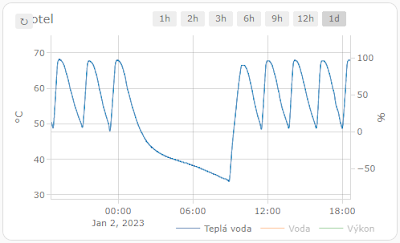Equipped with long term data, I started performing tests. As described previously, my home setup is not that simple.
Heating pipe for warm water tank is not separated from central heating pipes by three-way valve. When heating up the tank, the pump for tank circle runs and the other two are off. Vice versa when heating the central heating branches.
This is the usual temperature graph for a night (that means no warm water concumption):
From 65°C to 50°C in approximately 2,5 hours. The reason for not fully heated tank around 1:00 is there more expensive electric tariff between 1:00 - 2:00 and the boiler is turned off.
Hypothesis
My first idea was the water in tank is cooled by water from the central heating. So I closed valves for a night and checked the graph.
The cooling rate from 65°C to 45°C is the same as for any other night, so cooler water for the central heating is not the culprit. Why the tank cannot keep hot water longer was a mystery...
Culprit
Finding the real culprit required having a beer with neighbors in a pub. More head, the greater knowledge and soon we had a hypothesis that the loss of heat is caused by natural circulation. My warm water tank is in the basement and warm water pipes go through the house and returns to the tank. As pipes are relatively wide, they allow natural circulation. When I stopped the circulation, the graph looked much better. The loss was less than 15°C in 8 hours.
Now I just have to figure out what to do. With no circulation, it takes quite a long time to get warm water from the tap. With circulation, the cost of heating is high...
My current idea is to use electric valve and open the circulation just for a while, probably speeding it up with a pipe.
Edit:
The real culprit was found when new tank was installed - the reverse flap was faulty and caused natural circulation. Once fixed, the warm water can circulate only in one direction again and there is no natural circulation anymore.









No comments:
Post a Comment